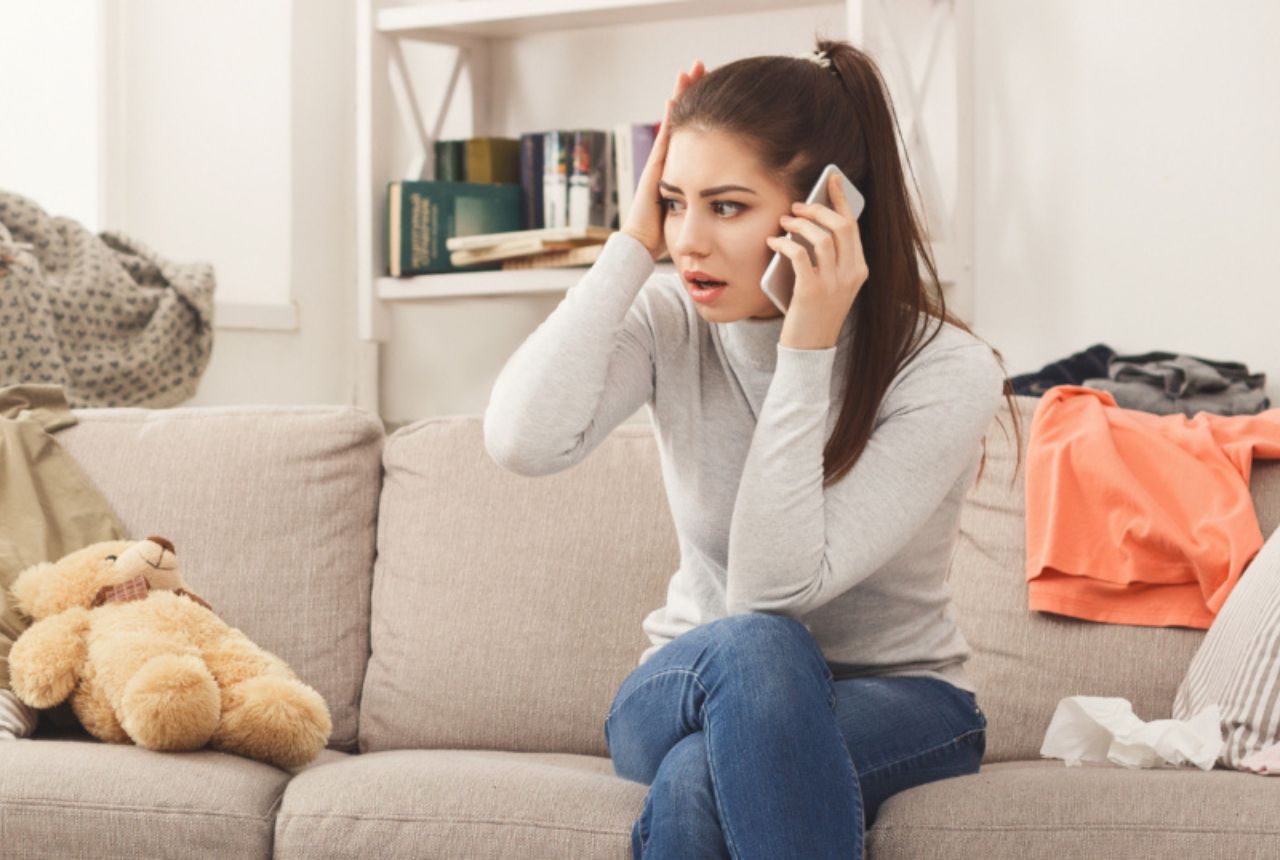Have you ever stepped into a cluttered room and felt a wave of unease wash over you?
Perhaps your eyes dart from the pile of laundry on the chair to the scattered papers on the desk, and suddenly, it feels like the walls are closing in.
If that sounds familiar, you’re not alone.
For some people, a messy space is more than just a mild inconvenience—it’s a psychological trigger that disrupts their ability to relax and feel at ease.
Think about it. How often have you heard someone say, “I just can’t focus until this place is cleaned up”?
Or maybe you’ve seen a friend compulsively start organizing a room before they can even sit down.
What’s fascinating is that this isn’t merely about liking things tidy.
For these individuals, there’s something deeper at play—a psychological need for order, balance, and control in their surroundings.
Psychologists suggest that the way we respond to clutter reveals a lot about our personalities, emotional needs, and even how we process the world around us.
While some thrive in organized chaos, others find the smallest bit of disorder mentally and emotionally draining.
It’s not about being “picky” or “obsessive”; it’s about how our environments influence our inner worlds.
In this blog post, we’ll dive into the six unique traits of people who struggle to relax in cluttered spaces, drawing on psychological insights to explain why some of us crave order so deeply.
Along the way, we’ll explore how these traits shape not only their relationship with their environment but also their broader approach to life, relationships, and personal well-being.
Whether you’re someone who thrives in a meticulously curated space or a person who has a “creative mess” philosophy, this exploration will give you a fresh perspective on the intricate connection between our minds and the spaces we inhabit.
Let’s uncover the psychology behind this fascinating trait and discover what it means for those who need clarity, calm, and control in their environment to truly find peace.
Get Smarter Everyday Join Us On WhatsApp
1. Heightened Anxiety in Disorganized Spaces
Imagine walking into a room where clothes are strewn across the floor, books pile precariously on tables, and random objects seem to occupy every available surface.
For some, this might feel like an invitation to get comfortable and relax, but for others, it’s an instant source of anxiety.
For individuals who can’t relax in cluttered spaces, the sight of disorganization triggers a visceral response.
It’s not just about being annoyed by the mess—it’s an overwhelming feeling of agitation that takes hold.
Their eyes dart from one misplaced item to another, unable to settle on anything but the chaos.
This reaction often stems from a deep-seated need for order and structure.
Psychologically, clutter represents unfinished tasks or disorder, which can weigh heavily on someone’s mind.
It creates a sense of mental “noise” that makes it hard to think clearly or focus.
These individuals might find it impossible to start a conversation, enjoy a meal, or even sit down until the clutter is addressed.
A close friend of mine comes to mind.
She describes the sensation as having her thoughts “cluttered” by the mess around her.
If the space is disorganized, she feels tense and irritable, even if there’s nothing else demanding her attention.
This isn’t about perfectionism—it’s about a genuine need for visual calm to achieve mental calm.
Interestingly, this connection between clutter and anxiety is backed by research.
Studies show that disorganized environments can elevate cortisol levels, the body’s primary stress hormone, leading to increased feelings of anxiety and unease.
Get Smarter Everyday Join Us On WhatsApp
For those with this trait, maintaining a tidy space isn’t just a preference; it’s a form of self-care and mental health preservation.
2. Increased Sensitivity to Environmental Stimuli
For some people, the chaos of a cluttered room doesn’t stop at the visual level.
It seeps into every sense—heightening their sensitivity to sights, sounds, smells, and even textures.
Known as Sensory Processing Sensitivity (SPS), this heightened awareness affects around 15-20% of the population, and for these individuals, cluttered spaces can feel utterly overwhelming.
Imagine stepping into a room where the television is blaring, the lights are harsh, the air smells faintly of stale coffee, and every surface is cluttered.
While many might brush off the noise and mess, someone with high SPS would feel overstimulated and unable to relax.
It’s not just the clutter—it’s the totality of sensory input that becomes unbearable.
I recall a conversation with a highly sensitive friend who explained how she experiences cluttered spaces.
She said it’s like her brain doesn’t filter out the “unimportant” details. Instead, every misplaced object screams for her attention, making the room feel like a battlefield of competing stimuli.
On the flip side, this sensitivity often comes with incredible benefits.
People with high SPS tend to have a heightened appreciation for beauty, whether in art, music, or nature.
They’re deeply moved by things others might overlook—a single flower in a garden, a subtle melody in a song.
This duality can make clutter especially problematic.
While their sensitivity allows them to see and feel beauty in profound ways, it also magnifies the chaos of disorganized spaces.
Get Smarter Everyday Join Us On WhatsApp
For these individuals, tidying up isn’t just about aesthetics—it’s about creating a serene environment that aligns with their deeply attuned senses.
Ultimately, their sensitivity to environmental stimuli makes them uniquely tuned into the world, but it also means they must be intentional about the spaces they inhabit to maintain their emotional balance.
3. A Deep Desire for Control and Stability
Imagine living in a world that feels perpetually chaotic—a place where unpredictability lurks around every corner, and nothing seems to stay the same for long.
For people who can’t relax in a cluttered space, that’s exactly how life feels when their surroundings are disorganized.
To them, clutter symbolizes chaos, and the only way to regain a sense of control and stability is to create order.
This need for control isn’t about being nitpicky or demanding.
It’s a psychological mechanism to cope with life’s uncertainties.
When everything else feels unpredictable, a clean and organized environment becomes their sanctuary—a safe space where they can breathe and find peace.
I once met someone who described her home as her “bubble of order.”
She worked in a high-stress job where things constantly shifted and changed, leaving her feeling powerless at times.
But when she came home, everything was just the way she left it—clean, organized, and exactly where it should be.
That sense of predictability in her environment gave her the grounding she needed to tackle the unpredictability outside of it.
Psychologists suggest that this need for control often arises from a desire to establish a sense of stability in one’s life.
For some, organizing their physical space is a way to counterbalance the mental or emotional chaos they may feel.
The act of tidying up isn’t just practical; it’s deeply symbolic. It’s their way of saying, “Here, at least, I am in control.”
Get Smarter Everyday Join Us On WhatsApp
This trait highlights the profound connection between our external environment and internal state.
A clutter-free space offers these individuals the structure and predictability they crave, helping them to feel more secure and at peace in an otherwise turbulent world.
4. A Need for Emotional Clarity Through Their Belongings
For people who can’t relax in a cluttered space, their belongings are more than just objects—they’re reflections of their emotional and mental state.
Each item might carry a story, a memory, or a practical purpose.
While this deep connection can make it hard to part with certain possessions, it also means that clutter can create significant emotional turmoil.
When too many items accumulate without order, it’s not just the physical space that feels cluttered—it’s their mind as well.
The mess acts as “mental noise,” disrupting their ability to think clearly or feel at ease.
This emotional tension often stems from the way they process the significance of their belongings.
Take, for example, a friend of mine who loves to collect books.
Each book she owns carries sentimental value—reminding her of a particular phase in her life, a person she connected with, or a lesson she learned.
But when her shelves start to overflow, the clutter becomes overwhelming.
She finds herself unable to focus on anything else until she reorganizes the space, deciding which books to keep and which to donate.
This process is about more than just tidying up—it’s a form of emotional decluttering.
By organizing her belongings, she’s able to restore a sense of balance and clarity, both in her space and in her mind.
Get Smarter Everyday Join Us On WhatsApp
Interestingly, this trait doesn’t reflect materialism or hoarding. Instead, it highlights how deeply connected these individuals are to their environment.
They need harmony between their space and their inner world to truly feel at peace.
Psychologists note that for these individuals, clutter disrupts their emotional equilibrium.
A messy space creates conflict between their desire for order and the emotional weight they attach to their belongings.
To them, tidying up isn’t just about aesthetics—it’s about finding emotional clarity and creating a space that reflects their inner peace.
5. A Need for Personal Space
For people who can’t relax in a cluttered environment, their space is more than just a physical area—it’s a personal sanctuary.
It’s where they recharge, reflect, and find solace after navigating the chaos of the outside world.
Clutter in this sacred space isn’t just distracting; it feels invasive, as though the mess is encroaching on their peace of mind.
Take, for instance, a close friend of mine, a highly creative individual who thrives in an industry full of unpredictable schedules and high-pressure demands.
Despite the whirlwind nature of her work, she has one unwavering rule: her personal space must be immaculate.
The moment she gets home, she tidies up any clutter, no matter how small, before she can unwind.
To her, a clutter-free space is essential for creating the calm she needs to recharge.
This deep need for order often extends beyond physical cleanliness. People with this trait view their space as an extension of their inner world.
If their environment feels disorganized, it reflects—and amplifies—the stress they’re already carrying.
Maintaining a clean, organized personal space becomes their way of reclaiming control and fostering emotional balance.
Get Smarter Everyday Join Us On WhatsApp
Psychologically, the need for personal space is tied to boundaries and self-preservation.
In a world that demands so much of them, these individuals rely on their space to recharge and realign their thoughts.
Clutter interferes with that process, making it impossible for them to fully relax or feel at peace.
Ultimately, a tidy personal space isn’t just about aesthetics; it’s about self-care.
For these individuals, their sanctuary represents a haven where they can retreat from the noise of the world and find true tranquility.
6. Procrastination Under the Guise of Tidiness
Let’s be honest—sometimes, the desire for a clean and organized space isn’t purely about needing a peaceful environment.
For some, tidying up can become a form of procrastination, a way to avoid tackling more demanding or uncomfortable tasks.
At first glance, this might seem counterintuitive.
After all, how can someone who needs a clutter-free space to relax also use tidying as a diversion?
The answer lies in the psychological comfort that organizing provides.
Cleaning up feels productive, giving them a sense of accomplishment even if it means delaying the real work they need to do.
Think about it—how often have you heard someone say, “I can’t start working until my desk is spotless”?
While there’s truth to the idea that a clean workspace enhances focus, for some, this mindset can become a crutch.
Tidying up becomes a way to justify putting off a daunting task, like tackling a challenging project or making a tough decision.
Get Smarter Everyday Join Us On WhatsApp
A friend of mine who is a writer, embodies this trait perfectly.
Whenever she’s on a tight deadline, she suddenly feels the urge to deep-clean her entire apartment.
It’s not that she doesn’t care about her work; it’s that cleaning gives her a temporary sense of control in moments when the task at hand feels overwhelming.
This behavior isn’t inherently bad—after all, a clean space does support productivity.
However, when tidying becomes an excuse to avoid responsibilities, it’s a sign that priorities might need to be reassessed.
Recognizing this pattern can lead to healthier habits.
By setting limits on cleaning time or tackling a small part of the clutter before diving into a bigger task, individuals can maintain a balance between their need for order and their broader goals.
Ultimately, while procrastination disguised as tidying might seem counterproductive, it highlights the deeper psychological connection between one’s environment and sense of control.
For those who can’t relax in cluttered spaces, finding this balance is key to maintaining both peace of mind and productivity.
Conclusion
For those who can’t relax in cluttered spaces, the need for order goes beyond mere tidiness—it’s a reflection of their emotional and psychological well-being.
Their environment acts as a sanctuary, offering calm in a chaotic world.
Understanding these traits fosters empathy and reminds us that everyone’s relationship with their space is deeply personal.
Whether you thrive in creative mess or orderly minimalism, the goal is the same: to create a space that nurtures peace, balance, and connection.
By respecting these differences, we can build environments that inspire comfort and harmony for all.
Get Smarter Everyday Join Us On WhatsApp







